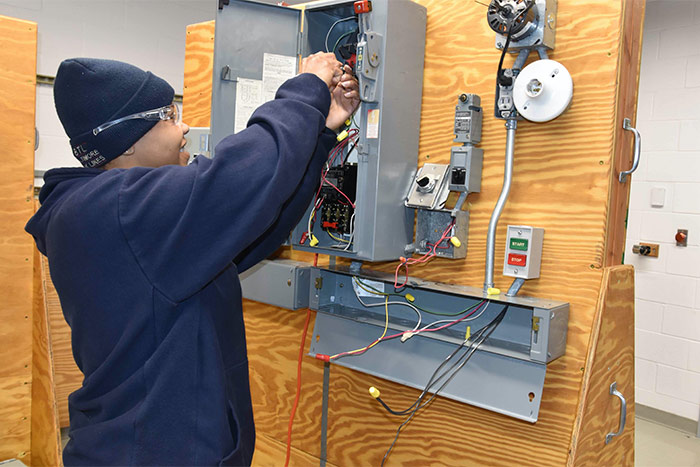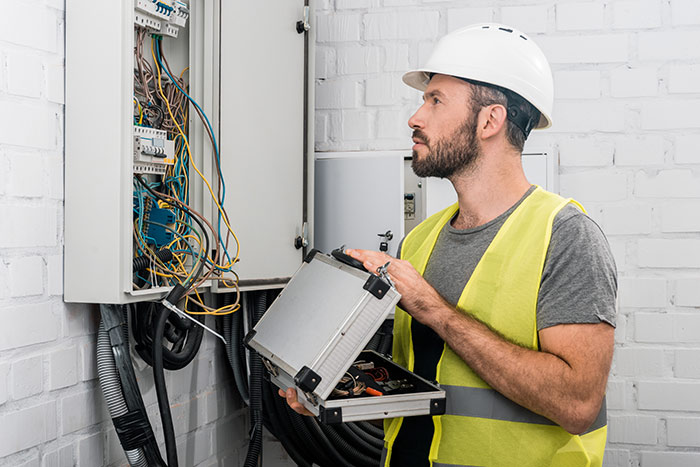Apprenticeship
Program
Application Information
Requirements
- Be at least 18 years of age (work permit required if under 18)
- Have high school diploma or GED
- Have reliable transportation
- Have a valid email address and be able to access online curriculum from a device other than cell phone
- Successfully complete a math comprehension assessment and interview
Tuition and Fees
There is no fee to apply. Tuition for the 2025-2026 academic year is $1,825*; books are included.
*Deposit of $182.50 for 1st year apprentices upon acceptance into the program. Cancellation fee 10% of tuition if less than 1 week prior to start of classes.
Scholarships available!
Deadline to apply for HCECA scholarship is August 1, 2025.

Application Information
Tuition and Fees
There is no fee to apply. Tuition for the 2021-2022 academic year is $1,700; books are included. *Additional technology fee up to $100
Scholarships available!
Requirements
- Be at least 16 years of age (work permit required if under 18)
- Have high school diploma or GED
- Have a valid driver’s license and possess transportation
- Be able to pass a math comprehension assessment
- Have a valid email address and be able to access online curriculum

In-Classroom Instruction
In addition to receiving skills training on the job, you’ll get trade-related classroom training that produces competency and pride, leading to true craftsmanship.
Hours Required: 144 hours of in-classroom instruction per year
(classes are 2x/week, 6:15-9 PM, September through April)
Topics Include:
- Basic Theory & Fundamentals of Electricity
- AC/DC Circuitry
- Motors, Generators, Transformers
- Grounding & Bonding
- Solar Photovoltaic Systems
- Power Quality
- Raceway, Box & Conductor Sizing
- Calculations, Etc.
- Basic Theory & Fundamentals of Electricity
- AC/DC Circuitry
- Motors, Generators, Transformers
- Grounding & Bonding
- Solar Photovoltaic Systems
- Power Quality
- Raceway, Box & Conductor Sizing
- Calculations, Etc.

On-the-Job Training
All apprentices must obtain full-time employment with a contractor who is a member of HCECA. Our association consists of member contractors who sponsor our apprentices and are committed to providing quality on-the-job training (OJT) for them.
Hours Required: 2,000 hours on-the-job training per year (the equivalent of a full-time job); 8,000 total hours required over four years
Your employer isn’t a member?
No Problem!
Your employer can join HCECA for a low yearly membership fee.
A certified, reputable apprenticeship program is the best way into a construction trade. Besides a very low-cost education (which means MINIMAL DEBT for YOU), apprenticeships offer a look into the day-to-day work you’ll be doing in your trade.
In the state of Maryland, completing a certified apprenticeship program qualifies as an additional three years of experience toward becoming a master electrician. Learn more.
Below is a list of just a few of the numerous benefits of training through an apprenticeship:
Learn the trade while you earn a living:
Apprenticeships enable you to start working and earn a decent wage while you learn key skills and gain the qualifications that future employers want. As your skills progress, so will your pay.
Never get bored:
Support:
One of the biggest advantages of getting the qualifications you need in your field while being able to put the skills you learn into practice at the same time, is that someone will always be there to show you how things are done.
Variety is key:
Apprenticeships offer a varied learning experience. You won’t be spending your days studying or sitting in a classroom; most of the time you’ll be working in the field.
Confidence:
Whether you’re on a jobsite or in the classroom, everyone understands that you’re there to learn. You can feel confident and ready for your apprenticeship as long as you’re prepared to work hard and learn.
Your apprenticeship will be very rewarding, even if at times it may seem demanding. Once you’ve completed your apprenticeship, you'll have a world of options open to you. Being able to show that you've got industry experience, plus related in-classroom instruction, will give you a huge advantage in your trade.
Your apprenticeship will be very rewarding, even if at times it may seem demanding. Once you’ve completed your apprenticeship, you'll have a world of options open to you. Being able to show that you've got industry experience, plus related in-classroom instruction, will give you a huge advantage in your trade.
After completing this program, you’ll have earned a journeyperson certificate which will increase your marketability as an electrician and qualify you to earn a journeyperson’s wage. Students may continue on to become Master Electricians and also have the option to enroll in a Harford Community College program with up to 21 college credits transferring toward an associate degree.
- Electrical Apprentice (while in the Apprenticeship Program) – Installs, adds and/or repairs electrical systems, conductors and associated materials and equipment under the supervision of a journeyperson electrician.
- Journeyperson Electrician – Installs, alters, adds and/or repairs electrical systems, conductors and associated materials and equipment. May work independently of direct technical supervision. Supervises apprentices. Will read blueprints, terminate cable, install and troubleshoot control wiring from drawings.
- Master Electrician – Installs, alters, adds and/or repairs electrical systems, conductors and associated materials and equipment. A master electrician may supervise journeyperson electricians.
- Project Manager – Installs, alters, adds and/or repairs electrical systems, conductors and associated materials and equipment. Has a journeyperson’s license. Works from plans and specifications, may supervise small crews of journeypersons, apprentices and helpers. Lays out the work and makes certain that the proper materials, tools and equipment are on the jobsite in their proper places and monitors the work while adhering to schedules.
- Estimator – Develops profitable bid proposals, calculates takeoffs, and ensures that the company’s best interests are represented, including profitability & cost control. Provides careful analysis of project plans to guarantee accurate labor, supply, and time schedule estimates.
- Owner/Contractor – owns and runs a business, has employees, and is in charge of projects.
Electricians are Essential Employees.
- In addition to jobs created by the increased demand for electrical work, openings are expected over the next decade as electricians retire or who transfer to different occupations. This will create good job opportunities, especially for those with the widest range of skills, including voice, data and video wiring.
- Increases in construction spending and demand for alternative energy sources will drive demand for electricians.
- Alternative power generation, such as solar and wind, is an emerging field that should require more electricians for installation. Increasingly, electricians will be needed to link these alternative power sources to homes and power grids over the coming decade.
To be in compliance with the state licensing regulations, apprentices must be registered with the State of Maryland. After registering and paying the $10 fee you will be able to download the PDF to print (or take a screenshot to have on your phone). You must have a copy of the license on you at all times when working on an electrical project. https://www.dllr.state.md.us/license/elec/.
- Click on Licensing Applications on the left side menu.
- Click on Apprentice Original License for the application.
2024-25 School Year Calendar
View the school year’s calendar here.
How to Apply for Your Electrical License from the State of Maryland: https://www.hcecamd.org/wp-content/uploads/2022/11/calendar-at-a-glance-2022-2023V-V2.pdf
Maryland Apprenticeship and Training Program (MATP)
To learn about being an apprentice in Maryland and to learn about requirements, policies and procedures, visit
https://www.dllr.state.md.us/employment/appr/
Bureau of Labor Statistics Occupational Outlook Handbook
To learn more about what electricians do, their work environment, and how to become an electrician, as well as job outlook, pay, state and area data, visit https://www.bls.gov/ooh/construction-and-extraction/electricians.htm
Career Path of an Electrician
To learn more about the career path of an electrician, visit https://www.careeronestop.org/Toolkit/Careers/Occupations/occupation-profile.aspx?keyword=Electricians&onetcode=47211100&location=Maryland
Harford County Continuing Ed requirements and deadlines
To learn more about Harford County Continuing Ed requirements and deadlines, visit https://www.harfordcountymd.gov/331/Electrical-Services
Harford Community College Credit Towards an Associate Degree
If you are interested in Harford Community College credit towards an associate degree, click here.
Credit Scholarship Opportunities
To learn about credit scholarship opportunities, visit https://harford.awardspring.com/Opportunities
HCECA/HCC Memorial Book Scholarship
Member Contractors Looking for Apprentices
View a list of our member contractors who may be looking for apprentices.
HCECA Standards
Click here to review our Standards, approved by the State of Maryland.
How to Create an HCC Account Click here for step-by-step instructions
How to Recover HCC Login Info Click here for step-by-step instructions
What Do Electricians Do?
Electricians install and maintain the electrical and power systems for homes, businesses, and factories. They also install and maintain electrical equipment and machines in factories and a wide range of other businesses.
In general, electricians focus on either construction or maintenance, although many do both. Electricians specializing in construction primarily install wiring systems in residential, commercial, or industrial buildings. Those specializing in maintenance fix and upgrade existing electrical systems and repair electrical equipment. All electricians must follow state and local building codes and the National Electrical Code when performing their work.
Electricians usually start their work by reading blueprints—technical diagrams that show the locations of circuits, outlets, load centers, panel boards, and other equipment. After determining where all the wires and components will go, they install and connect the wires to circuit breakers, transformers, outlets, or other components and systems.
